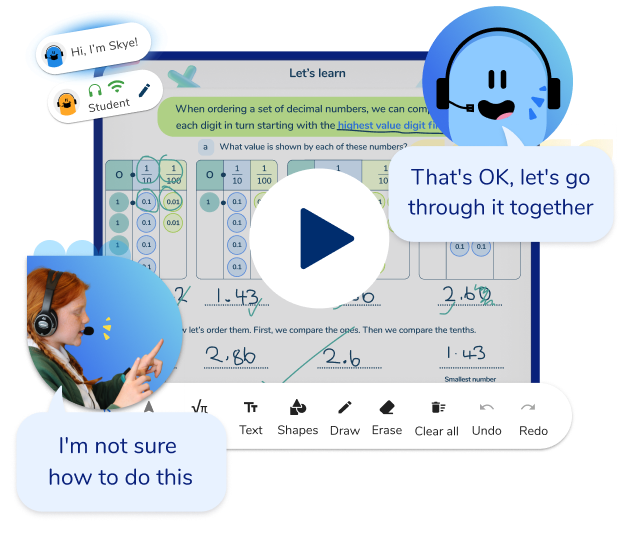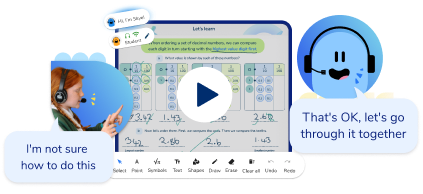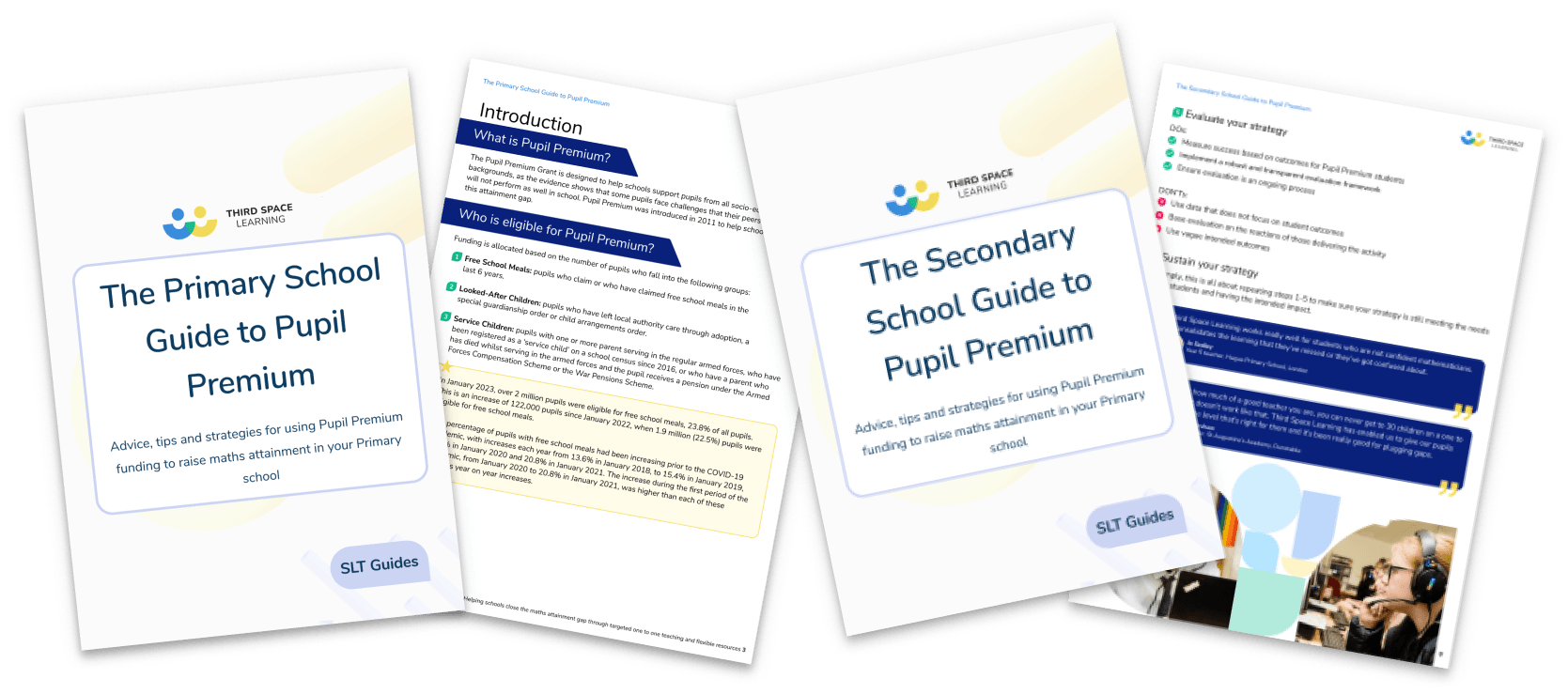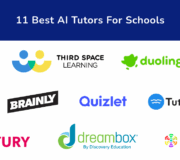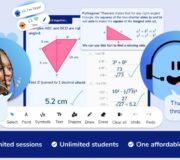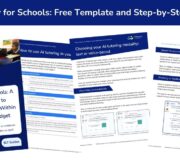How To Get The Most Out Of Tutoring For Disadvantaged Students
Schools have known for a while that tutoring for disadvantaged students is one of the most effective measures available to narrow the attainment gap. However the intensiveness of one to one tutoring has led people to believe it’s also one of the more costly interventions.
In fact, if seen as a return on investment in terms of progress made by students, tutoring is one of the most cost effective interventions. But there is an initial outlay.
In this article we look at how you can harness the benefits of one-to-one tutoring specifically to bolster disadvantaged students in your school and help to close the attainment gap in an affordable and cost effective way.
Tutoring for disadvantaged students in schools
Third Space Learning has always focused on tutoring disadvantaged students as that is where we believe the greatest need lies. However we know school budgets are very stretched so we provide our tutoring online in order to reduce the cost to schools.
Following lockdown and school closures during the coronavirus pandemic the DFE-backed National Tutoring Programme (NTP) provided funding for primary schools and secondary schools to access tutoring in whatever way suits them best – online or face to face.
The intention was always that this should be predominantly focused on the learning losses from school closures which fell hardest on disadvantaged students.
The Senior Leader’s Guide to Pupil Premium
Informative and concise guides on the interventions that will have the biggest impact for the children in your care.
Download Free Now!Pupil Premium and funding for catch up
As well as the National Tutoring Programme funding, Pupil premium is still available to support school pupils from disadvantaged backgrounds with strategic interventions that are based on strong external evidence.
All forms of tutoring have evidential backing from the Education Endowment Foundation EEF (see below) and one to one tutoring (as opposed to small group tuition) has long been seen as the gold standard of pupil premium support.
For the 2024/2025 academic year, the rates for Pupil Premium will increase by between 1.4 and 1.7%. This is below the rate of inflation which is around 3.9%.
- Primary pupils who are eligible for Free School Meals, or have been eligible in the past 6 years: £1,480
- Secondary pupils who are eligible for Free School Meals, or have been eligible in the past 6 years: £1,050
- Looked after pupils currently or previously in local authority or other state care: £2,570
Why the focus on disadvantaged students?
Before we look at how to most effectively implement tutoring for disadvantaged students, it’s worth remembering why they need a specific approach.
A student is classified as ‘disadvantaged’ for any of the following reasons:
- Eligible for Free School Meals (FSM) or have been in the last six years.
- Looked After Children (LAC) or have been previously.
- Children with parents in the armed forces.
Low family income, little or no family support and children having experienced many school moves are factors believed to have an impact on academic performance. Research by RSA found that only around 27% of students who have experienced three or more school moves, achieve at least five Grade 4+, compared with the national average of 60% of students.
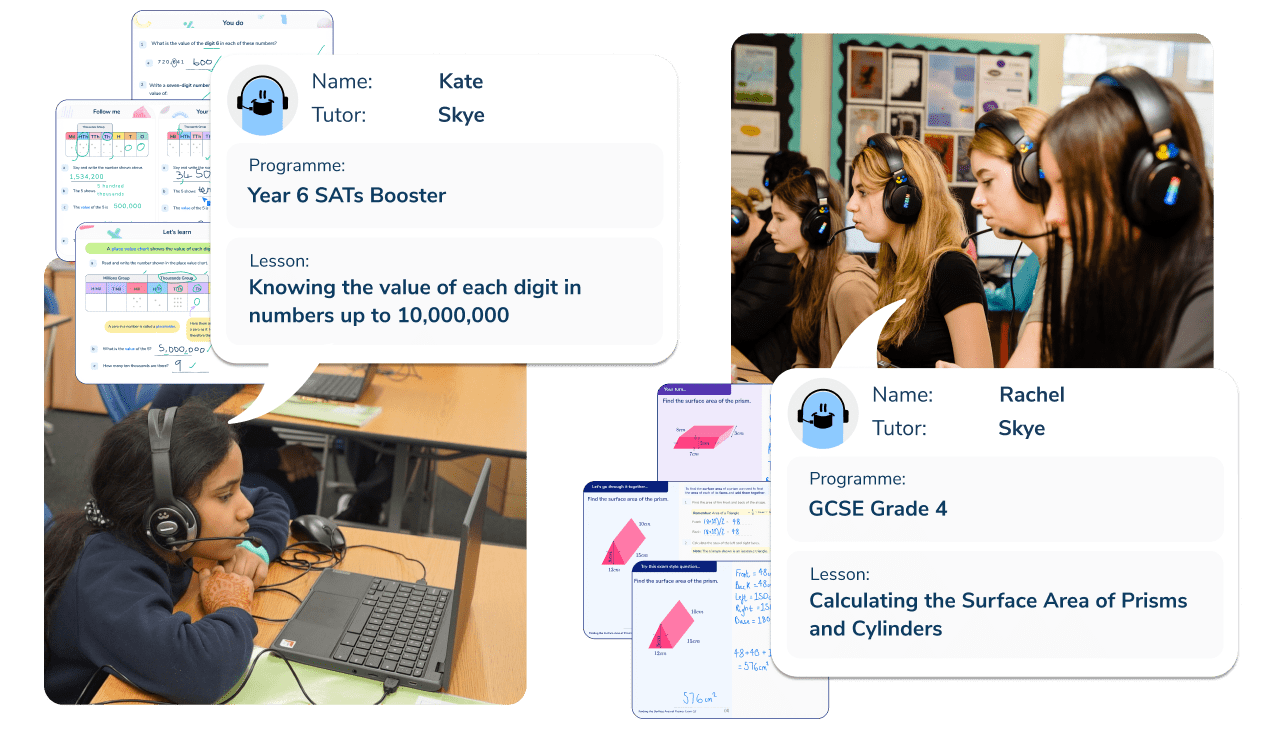
Meet Skye, the voice-based AI tutor making maths success possible for every student.
Built by teachers and maths experts, Skye uses the same pedagogy, curriculum and lesson structure as our traditional tutoring.
But, with more flexibility and a lower cost, schools can scale online maths tutoring to support every student who needs it.
Watch Skye in actionSuccessful interventions for disadvantaged students
When deciding how to spend funding and improve schools the EEF guidance lists three categories that should be considered for successful and effective interventions.
- High quality teaching
- Targeted academic support
- A wider strategy that focuses on student’s non-academic needs such as social, behavioural and emotional needs.
Interventions that target all three of these considerations are more likely to be successful in supporting disadvantaged young people and helping to raise their academic attainment.
Read more: Best online tutoring websites
Supporting disadvantaged students is good for all students
Though these initiatives focus on supporting disadvantaged students, the strategies and considerations brought forward by the Education Endowment Foundation and the Department for Education are beneficial to all students and can help to improve schools and teaching methods, raising attainment across the board.
What the EEF says about tutoring for disadvantaged students
High quality one-to-one tutoring offers targeted support that encapsulates the three considerations above as it focuses on the needs of each individual child.
The EEF reports that ‘on average, one to one tuition is very effective at improving pupil outcomes. One to one tuition might be an effective strategy for providing targeted support for pupils that are identified as having low prior attainment or are struggling in particular areas’. In addition, they found that a programme of 10 weeks with 2-3, 30 minute one-to-one tutoring sessions can add as much as five months to academic progress within the school year.
The speed of catch-up from one-to-one tutoring is particularly impactful as studies have found that students who fall behind in KS2 have an increasingly more difficult time catching up to their peers in secondary school. This gap can in turn affect GCSE, where only 40% of students eligible for free school meals earn a grade 4+ in Maths and English, compared to 66% of all other students. The gap continues through A-Level results and can limit options beyond secondary school.
One-to-one tutoring provides disadvantaged students with the individualised attention that they may not receive elsewhere and as such accelerates learning, improves academic performance and increases confidence.
Specific challenges for disadvantaged students
When considering introducing an intervention programme for disadvantaged students, whether from one of the government tutoring providers or otherwise, school leaders must first consider what issues impact students and what specific challenges they face.
An awareness of these issues underpins the Third Space Learning tuition approach and helps to inform our recommendations.
Confidence issues and maths anxiety
Low-confidence in maths is a common issue among disadvantaged students (and all students). In a subject where there is only one correct answer, the fear of getting it wrong can be hard to overcome, compounding this with language hurdles (maths language and potentially ESL) and participating in maths class can seem extremely intimidating for young learners.
Students may experience maths anxiety, a feeling of panic and helplessness when confronted by a maths problem. Maths anxiety can be a vicious cycle, with students performing poorly in maths causing them to have anxiety and the anxiety then causing them to perform poorly.
TSL recommendation: One of the advantages of tutoring for disadvantaged students, is that you can establish a safe space where students feel that they are able to ask questions and make mistakes without fear of judgement. Look for tutors who are encouraging, reassuring and who understand the emotional component that influences performance in mathematics.
Don’t assume lower ability
Disadvantaged students are no less able than other students. Often disadvantaged students’ parents do not have careers with academic backgrounds and children can struggle to see why they should either. This mindset can be demotivating, but a lack of motivation does not translate into a lack of ability. When disadvantaged students have the mindset and support necessary to apply themselves, they can be high attainers.
TSL recommendation: When considering the implementation of a tutoring programme, think about how you can provide a positive role model, raise students’ motivation to learn and alter their mindset around learning.
Home life
Whereas non-disadvantaged students may have parents to help with homework, a quiet place to do homework, a private tutor on the weekend or may be involved in other enrichment activities, home life can be more challenging for disadvantaged students.
Many disadvantaged students’ parents may work shifts or multiple jobs, the disadvantaged student may be caring for younger siblings, lack a quiet space to study, experience instability at home or have a part time job. In these circumstances getting one-to-one support and extra time outside of the classroom to focus on their learning is a challenge which can impact their academic performance. In addition, when a young person already has a lot of responsibilities, getting an A in maths may feel low on the priority list.
TSL recommendation: Tutoring programmes should aim to encourage students though not pressure them, and help to convey the value of academics and reassure disadvantaged students that they have what it takes to succeed.
Further action we’ve taken to consider disadvantaged students
At Third Space Learning, our chief ambition is to close the maths attainment gap between disadvantaged and non-disadvantaged students and our one-to-one online tuition is centred around this goal.
Affordability while maintaining quality
Firstly, we want our tuition to be affordable and accessible for all, that’s why we implement online tutoring (rather than in person face-to-face). By using online tutors we are able to decrease costs whilst also maintaining a high quality of teaching with well trained and vetted tutors.
At Third Space Learning, we provide our tuition to schools, rather than parents, making tuition available in relation to utilising pupil premium funding. WBy doing this, we make our services available to those who need it most; disadvantaged students.
Targeted academic support
In their first session of our online tuition programme, each student takes an online diagnostic assessment that is used to identify learning gaps. The programme is then tailored to focus on these specific areas for additional support and fill the gaps. This process provides personalised learning for students who may not otherwise have that opportunity.
In a one-to-one setting, tutors are able to tailor their instruction to the learning style of each child, something that’s simply impossible in a class of 30. Adapting instruction to the interests of the one child can also help to motivate and engage the student.
Our tutors are also trained and advised on how to cater lessons to the needs of students with learning disabilities and special educational needs including autism, ADHD, dyslexia and more.
Targeting the academic support to the specific needs of the child can help students to achieve their attainment goal. After each session, class teachers receive a detailed report on the progress that each student is making so that they can monitor students’ progress and track their learning throughout the academic year.
Building confidence
In a one-to-one setting, maths anxiety and low confidence can be mitigated as asking questions and making mistakes is no longer observed by a classroom full of their peers.
Students feel more comfortable speaking up during one-to-one tutoring and receiving positive feedback in those sessions, students’ confidence grows, spilling back into the regular classroom setting boosting the voices of disadvantaged students in the standard classroom;
“I think it is those who say things like ‘oh I’m no good at maths’, ‘I’m wobbly’, ‘I’ll never get this’. It gives them that confidence they’re missing.”
A teacher at St. Michael’s school observed that pupil premium students who were undergoing Third Space Learning tutoring programmes demonstrated ‘more confidence in whole-class lessons, improved ‘maths talk’ when they tackle problems and most importantly, maintaining or exceeding their expectations’.
Student support
Students engaged in Third Space Learning online interventions will be matched with the same tutor week on week, building a constructive, trusting relationship and providing them with a maths mentor.
Tutors actively aim to give specific praise, something disadvantaged students may not receive in other aspects of their lives, this can help to reassure and encourage students as well as change their mindset and attitude towards learning.
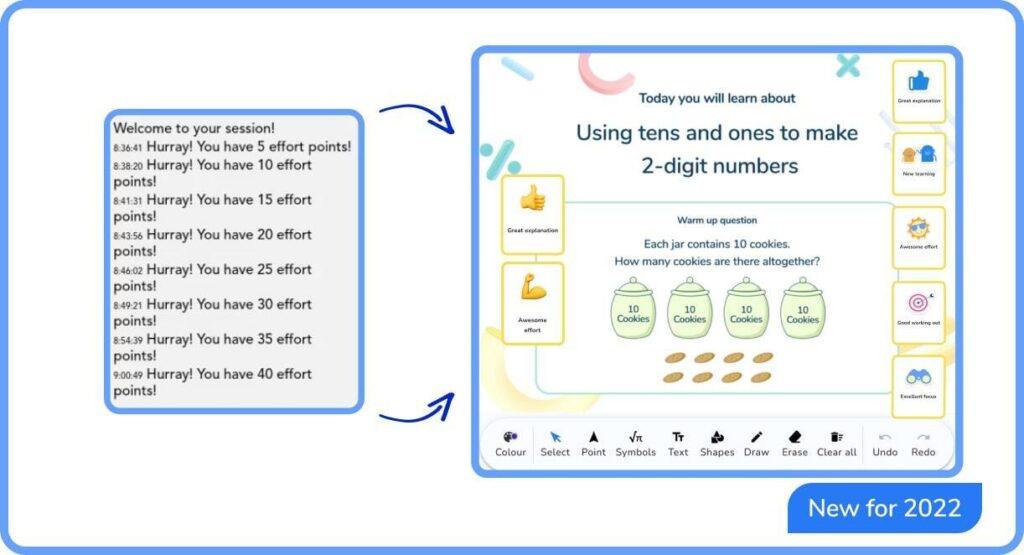
A teacher at Thorntree Academy observed that by receiving tuition from Third Space Learning ‘gives them [students] the opportunity to regularly speak to somebody and establish a relationship. The children develop their oracy as well and we have seen a change in how they speak and talk about maths and their wider learning in general. . . I think it does show that tutoring can impact positively, in terms of pupils being good citizens and being able to talk to different people from different contexts’.
Helping disadvantaged students succeed
At Third Space Learning, we’ve tutored over 128,000 students and supported 3,398 schools across the UK since 2013. In the 2021/22 school year alone, we provided online tuition to 33,839 disadvantaged students and have been delighted to see them succeed, with 90% showing deep conceptual understanding after each session and 70% of students reporting more confidence in their maths skills at the end of the programme.
We know how important it is to understand the challenges young people face in their learning journey and adapt to their needs. We hope that this blog has given you some helpful information that you can take with you into your school and classroom to help all of your students excel.
Read more: How To Create A Comprehensive And Effective Pupil Premium Strategy
DO YOU HAVE STUDENTS WHO NEED MORE SUPPORT IN MATHS?
Skye – our AI maths tutor built by teachers – gives students personalised one-to-one lessons that address learning gaps and build confidence.
Since 2013 we’ve taught over 2 million hours of maths lessons to more than 170,000 students to help them become fluent, able mathematicians.
Explore our AI maths tutoring or find out about online maths tuition for your school.
